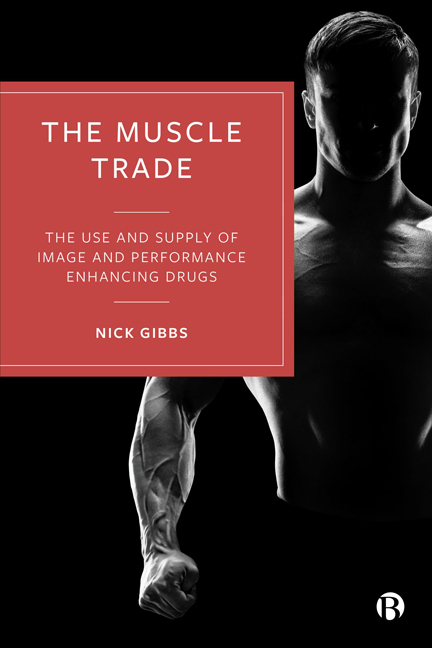Book contents
4 - Desire and Dissatisfaction in the Gym
Published online by Cambridge University Press: 28 March 2024
Summary
Having explored my fieldsites through the lens of deviant leisure, attention can now be turned to my participants’ motivation to consume IPEDs. This exploration is divided into four interconnected chapters, spanning several levels; from a psychoanalytic account of lack and bodily dissatisfaction, through to a broader recognition of the meso and macro cultural contexts that shape my participants’ world.
The first of these aims to address the current lacuna of deep theoretical engagement with the motivation to consume IPEDs and build the body that exists within the academy (van de Ven et al, 2020). This therefore answers Kotzé et al’s (2020) call for psychoanalytic engagement with the concept of lack within spaces of hardcore bodywork, alongside an acknowledgement of the politico-economic backdrop to IPED use and gym culture in the Global North. The central questions that this collection of chapters sets out to answer are why the sample of men to whom I spoke risked long-term health issues and myriad aches, pains, and strains, to build their physiques, and what compelled them to haul their engorged bodies to the gym when most of us would prioritize rest, ease, and comfort. In pursuit of an answer, this initial consumption chapter draws on psychoanalytic theory to interrogate the role of deficit and desire in driving compulsive bodywork and explaining the allure of IPEDs.
Lack, desire and the objet petit a
As set out in the previous chapter, the starting point of the ultra-realist conception of personhood is Lacan’s contention that the subject is governed by a sense of lack and deficit (Žižek, 2000; Hall and Winlow, 2015; Ayres, 2022). Lacan contends that all human behaviour can be understood to be motivated by an attempt to overcome this innate lack and reach a state of satisfaction that never, and can never, truly exist (Gammon and Palan, 2006; Flisfeder, 2014; Raymen and Smith, 2017). This imagined sense of satiation is understood by Lacan as the objet petit a, or the lost object, and describes an intangible thing that ‘orients the subject’s desire even though the subject has never had it’ (McGowan, 2016: 26).
- Type
- Chapter
- Information
- The Muscle TradeThe Use and Supply of Image and Performance Enhancing Drugs, pp. 57 - 71Publisher: Bristol University PressPrint publication year: 2023

